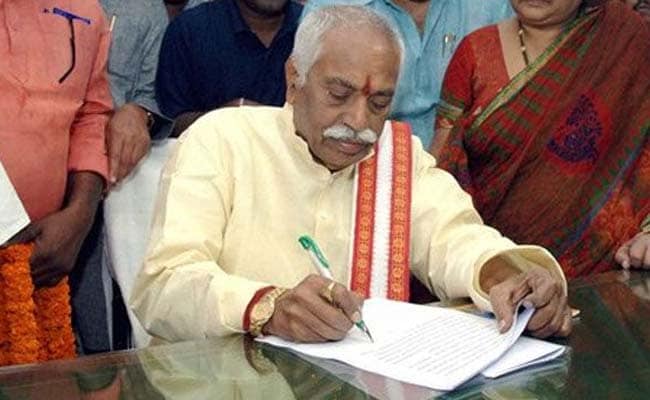
Bandaru Dattatreya said he has given a satisfactory explanation to the ILO and UNICEF.
New Delhi:
India will be able to ratify two International Labour Organization (ILO) conventions, 182 and 138, related to maternity benefits and abolition of child labour, as the country has completely banned it up to the age of 14 years, Labour Minister Bandaru Dattatreya said today.
"Since Child Labour (Prohibition and Regulation) Amendment Bill, 2016 passed by Parliament prohibits employment of children up to 14 years of age, the ILO conventions 138 and 182 will be ratified," the minister told reporters in New Delhi. The new law is much better as compared to the original Child Labour (Prohibition and Regulation) Act, 1986, he said.
International Labour Organization's Convention No 183 provides for 14 weeks of maternity benefit to women. Women on maternity leave are entitled to a cash benefit which ensures that they can maintain themselves and their children in proper health conditions.
The government, among other issues, is in the process of increasing maternity leave to 26 weeks from existing 14 week under the Maternity Benefit Act.
Convention No 138, on the other hand, aims at abolition of child labour.
The minister's comments come after certain organisations tried to create an impression that the Amendment Bill allows first time employment of children below 14 years in family enterprises while no such provision was there in the original Act of 1986, adversely impacting their schooling and learning.
Mr Dattatreya clarified that there cannot be any employee and employer relationship in case the worker's age is below 14 years.
The new law only provides for help by children up to the age of 14 years in family enterprise after school hours without affecting their education, he explained.
The UN Children's Fund had voiced concern yesterday over the amended Child Labour Bill in India, saying it could legitimise family work and further disadvantage children from poor families.
The UN programme urged removal of certain provisions of the Bill and advocated establishing a robust monitoring mechanism with a thorough list of hazardous occupations for a stronger child protection framework.
Mr Dattatreya said he has given a satisfactory explanation to the ILO and UNICEF representative who met him today.
He also said that while formulating rules for the implementation of this Act, the government will ensure that none of its provisions is misused.
"Since Child Labour (Prohibition and Regulation) Amendment Bill, 2016 passed by Parliament prohibits employment of children up to 14 years of age, the ILO conventions 138 and 182 will be ratified," the minister told reporters in New Delhi. The new law is much better as compared to the original Child Labour (Prohibition and Regulation) Act, 1986, he said.
International Labour Organization's Convention No 183 provides for 14 weeks of maternity benefit to women. Women on maternity leave are entitled to a cash benefit which ensures that they can maintain themselves and their children in proper health conditions.
The government, among other issues, is in the process of increasing maternity leave to 26 weeks from existing 14 week under the Maternity Benefit Act.
Convention No 138, on the other hand, aims at abolition of child labour.
The minister's comments come after certain organisations tried to create an impression that the Amendment Bill allows first time employment of children below 14 years in family enterprises while no such provision was there in the original Act of 1986, adversely impacting their schooling and learning.
Mr Dattatreya clarified that there cannot be any employee and employer relationship in case the worker's age is below 14 years.
The new law only provides for help by children up to the age of 14 years in family enterprise after school hours without affecting their education, he explained.
The UN Children's Fund had voiced concern yesterday over the amended Child Labour Bill in India, saying it could legitimise family work and further disadvantage children from poor families.
The UN programme urged removal of certain provisions of the Bill and advocated establishing a robust monitoring mechanism with a thorough list of hazardous occupations for a stronger child protection framework.
Mr Dattatreya said he has given a satisfactory explanation to the ILO and UNICEF representative who met him today.
He also said that while formulating rules for the implementation of this Act, the government will ensure that none of its provisions is misused.
Track Latest News Live on NDTV.com and get news updates from India and around the world

